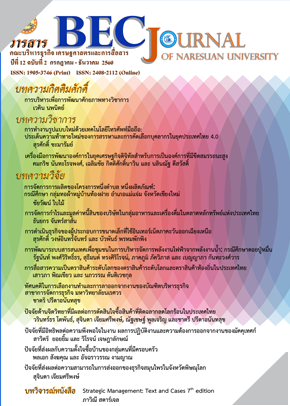เครื่องมือการพัฒนาองค์การในยุคเศรษฐกิจดิจิทัลสำหรับการเป็นองค์การที่มีขีดสมรรถนะสูง
Main Article Content
บทคัดย่อ
บทความนี้มีวัตถุประสงค์เพื่ออธิบายเครื่องมือการพัฒนาองค์การในยุคเศรษฐกิจดิจิทัลเพื่อการเป็นองค์การที่มีขีดสมรรถนะสูง โดยนำเสนอให้เห็นการเปลี่ยนแปลงของเศรษฐกิจและสังคมที่ก้าวเข้าสู่เศรษฐกิจยุคใหม่ ซึ่งทำให้องค์การจำเป็นต้องมีการพัฒนาองค์การ นำเสนอแนวคิดและเครื่องมือในการพัฒนาองค์การให้เป็นองค์การที่มีขีดสมรรถนะสูงที่มีความยืดหยุ่น สามารถปรับตัวและมีแผนการรองรับกับการเปลี่ยนแปลงของสภาวะต่างๆ รอบด้านได้อย่างมีประสิทธิภาพ เครื่องมือที่สำคัญในการพัฒนาองค์การให้มีขีดสมรรถนะสูง คือ ทีมงาน ซึ่งเป็นการพัฒนาองค์การระดับกลุ่ม โดยการสร้างและพัฒนาทีมงานให้เกิดการเรียนรู้ร่วมกันเป็นทีม (Team Learning) เป็นกลไกสำคัญในการขับเคลื่อนการเปลี่ยนแปลงอย่างมีแบบแผนในการวินิจฉัยปัญหา รวบรวม และวิเคราะห์ข้อมูล ดำเนินการเปลี่ยนแปลงและพัฒนา ตลอดจนประเมินผลและติดตามผล จนพัฒนาไปเป็นทีมจัดการความรู้ ก่อเกิดวัฒนธรรมองค์การใหม่ โดยมีเทคโนโลยีและการสื่อสารในยุคเศรษฐกิจดิจิทัลมาสนับสนุนทีมในการพัฒนาองค์การให้มีขีดสมรรถนะสูง จำแนกเป็นเทคโนโลยีที่นำมาใช้สนับสนุนการสื่อสารของทีม เทคโนโลยีที่นำมาใช้สนับสนุนการทำงานร่วมกัน และเทคโนโลยีที่นำมาใช้ในการจัดเก็บและกระจายความรู้ ทั้งนี้เพื่อเป็นแนวทางที่สำคัญในการพัฒนาองค์การให้มีขีดสมรรถนะสูงท่ามกลางกระแสการเปลี่ยนแปลงของสังคมและเศรษฐกิจในยุคปัจจุบันและอนาคตต่อไป
Article Details
เอกสารอ้างอิง
Academic Office of The Secretariat of the House of Representatives. (2015). Digital Economy: Policy for Driving the New Economy. Retrieved from http://www.parliament.go.th/library. (in Thai).
Arun Raktham. (1986). Organization Development for Change. Bangkok: National Institute of Development Administration.
Bodin Vijarn. (2005). Knowledge Management towards Wisdom Practices. Bangkok: Expertnet. (in Thai).
Kanchana Kaewthep and Nikom Chaikunpon. (2012). New Medias Study Manual. Bangkok: Metheevijai Awarded Project, The Office of Thailand Research Fund. (in Thai).
Kanchana Kaewthep. (1998). Media Analysis: Concepts and Techniques. Bangkok: Pimluk. (in Thai).
Kittipong Klomkom. (2003). Data Warehouse Design and Development. Bangkok: KTP Comp & Consult. (in Thai).
Kriengkrai Bhuvanij, Prasong Praneetpolgrang and Kulthon Kasemsan. (2015). An Empirical Investigation and Analysis on the ICT HR Competency in the Government Sector to Support Digital Economy. The Eleventh National Conference on Computing and Information Technology (Page 541-546). Bangkok: King Mongkut’s University of Technology North Bangkok and Partners. (in Thai).
Mana Korrangkoon. (1977). Organization Development. Bangkok: Khanit Publish and Advertisement. (in Thai).
Manit SanKaseam. (2009). The Relationship between Leadership and the High Performance Organization
Ministry of Digital Economy and Society. (2017, January 9) Digital Economy. Retrieved from http://www.mict.go.th/view/1/Digital%20Economy. (in Thai).
Narin Chaemchamrat. (1999). Organization Development. 1st ed. Bangkok: Human Capital Development Centre, Suan Dusit Rajabhat University. (in Thai).
National Electronics and Computer Technology Center. (n.d.). New Economy Indicators. Retrieved from https://www.nectec.or.th/por/differ.html. (in Thai).
Nittaya Petchnoi. (2010). Database System for vocational school. Master Project Master of Science in Information Technology, Graduate School, North Bangkok University. (in Thai).
of the Metropolitan Electricity Authority. Master of Business Administration Thesis, Thonburi University. (in Thai).
Pasu Decharin. (2007). Learning Organization and Organizational Culture. Bangkok: Pimdee. (in Thai).
Penpitcha Khodchalee. (2013).: The Relationship between Strategic Management and High Performance Organization of School under Nakhon Khon Kaen Municioality. Master of Education Thesis in Educational Administration, Faculty of Education, Loie Rajabhat University. (in Thai).
Piyapak Sinbuathong. (2545). Communication and Team Building. Journal of Library & Information Science, Khon Kaen University, 20 (2), 43-51. (in Thai).
Prathana Arunyig. (2006). Instant Messaging (Emotion Communication via Instant Messaging Program). Master of Arts Thesis, Faculty of Communication Arts, Chulalongkorn University. (in Thai).
Rewat Sangsuriyong. (2004). Virtual Team. Journal of Humanities and Social Sciences Burapha University, 12 (16), 63-91. (in Thai).
Sombat Kusumavalee. (2008). Philosophy of Sufficiency Economy and Organization Development. NIDA Development Journal, 48 (1), 85-105. (in Thai).
Sunandha Laohanandha. (1988). Organization Development. Bangkok: DD Bookstore. (in Thai).
Supinda Teeravarapich. (2005). Team Learning for Organization Development. Human Resource Development Journal, 1 (1), 257-275. (in Thai).
Surath Chaichomphu. (2013). The Application of Information Technology for Organization Development. Journal of Educational Administration Burapha University, 7 (1), 1-14. (in Thai).
Sureerak Wongtip. (2014). New Media: The Key for Modern Organization Development. MUT Journal of Business Administration Review, 4 (1), 79-97. (in Thai).
Varaporn Tragoolsrid. (2006). Teamwork. 1st ed. Bangkok: Soon Songserm Vichakarn. (in Thai).
Vasana Sukkrasanti. (1997). World of Computer and Information System. 1st. Bangkok: Chulalongkorn University. (in Thai).
Wanwimon Ammarinnukhro. (2008). Organization Development Concepts. Ramkhamhaeng University Journal, 25 (3), 90-105. (in Thai).
Bennis, Warren G. (1969). Organization Development: Its Nature, Origins, and Prospects. Reading, Massachusetts: Addison-Wesley.
Blanchard, Ken. (2006). Blanchard on Leadership and Creating High Performing Organization. California: The Ken Blanchard.
_______. (2007). Leading at A High-Level. New Jersey: Prentice-Hall.
Burke, W. W.; & Schmidt, W. H. (1971). Management and Organization Development. Personal Administration. 34 (March, 1971): 45.
Frank Buytendijk. (2006). The Five Keys to Building a High Performance Organization. Business Performance Management Magazine (Gartner Group), February 2006.
French, W.L., Bell, C.H., Jr., and Zawacki, R.A. (2005). Organization Development and Transformation: Managing Effective Change. New York: McGraw-Hill.
Gomez-Mejia, L.R., Balkin, D.B. & Cardy, R.L. (2001). Managing human resources. 3rd ed. New York: Prentice Hall.
Lawrence M.Miller. (n.d.). The High-Performance Organization An Assessment of Virtues and Values Prepared for the European BAHA’ í Business Forum.
Lorsch, J. W., and Paul R. Lawrence. (1969). Organizational Development: Diagnosis and Action. Reading, MA: Addison-Wesley Publishing Company.
Newstrom, John W., & Davis, Keith. (2002). Organizational behavior: Human behavior at work. (11th ed.). New York: McGraw-Hill.
Pettigrew, A. and Whipp, R., (1991). Managing Change for Competitive Success. Oxford: Blackwell Publishers.
Senge, P. M. (1990). The fifth discipline: The Art & Practice of The Learning Organization. New York: Century Press.
Smither, R.D., Houston, J.M. and McIntire, S.D. (1996). Organization Development: Strategies for Changing Environment. New York: HarperCollins.
The Ministry of ICT. (2011). National ICT Policy Framework 2011-2020: ICT2020. Bangkok, Government of Thailand: Author.


